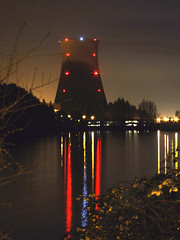
- Image by Curtis Gregory Perry via Flickr
For the first time in 30 years, the federal government of the United States is prepared to finance the construction of two new nuclear reactors.
How can we do this?
It's all about reducing greenhouse gas (GHG) emissions. As part of a law passed in 2005, the DOE is authorized to guarantee loans for projects that reduce GHG emissions. President Obama's 2011 budget triples loan guarantees for nuclear plants to more than $54 bil.
Why 30 years?
In short: The near-catastrophe of Three Mile Island happened in 1979 in Pennsylvania.
During that time, many existing plants were partially or completely shut down, such as Rancho Seco and San Onofre Unit 1, both in California. Prior to the Three Mile Island incident, the Humboldt Bay plant in California was closed because it was discovered to be operating on top of the Little Salmon Fault-line.
Plant closings and minor accidents are what many associate with nuclear power since that's all they hear about on the news. What I think most people don't realize is that 2008 energy figures show that nearly 20% of the U.S.'s total electric energy consumption came from nuclear sources. These 806.2 bil kW-h of electricity makes the U.S. the world's largest supplier of commercial power. This is generated by 104 commercial nuclear power plants, 69 of which are pressurized water reactors, with 35 boiling water reactors making up the remainder.
By contrast, 78% of France's electrical power production came from nuclear sources during this same year. But since the United States is a much bigger country, this larger percentage only represents 425.8 TW-h.
Some slightly different figures are listed here but this is still helpful in giving the relative amount of nuclear power per country. When examining on a total TW-h basis, it still lists the U.S. and France as the first and second most nuclear countries. By per capita, France is still #2, but the U.S. falls to #9, with Sweden claiming the top spot.
So, even though this nuclear policy seems new, it doesn't change anything for the present. It may signal a future shake-up of energy sources, but a <2% growth in the total number of American nuclear plants represents only a first step, at best.
[stats: http://www.eia.doe.gov/emeu/aer/pdf/pages/sec9.pdf]
Do these figures surprise you?
Do they make you more or less supportive of using nuclear power in the U.S.? Share Your Opinion.
Related articles by Zemanta
- Obama's nuclear vision suffers setback as Vermont plant faces shutdown (guardian.co.uk)
- Fed loan guarantees may boost nuclear power return (seattletimes.nwsource.com)
- Chu: Energy initiatives could bring jobs to Colo. (sfgate.com)



Comments
Construction of a new Nuclear Facility isn't quick - we should have started building these quite awhile ago to stem the environmental issues around traditional energy production. Nuclear power is great - as long as all safety procedures are followed and fail-safes are designed into the process, which is what should happen in every process - nuclear or otherwise.
The costs associate with acquiring permits and costs due to construction of a nuclear power plant are enormous, on the order of billions. This initial expenditure of capital with no guarantee of return of investment is an enormous risk and creates a barrier for institutions without deep pockets. To counteract this, the DOE (Department of Energy) under leadership from the Obama administration has recently offered $8 billion in loan guarantees for what may be the first of another string of nuclear power plants.<a href="http://articles.latimes.com/2010/feb/16/nation/la-na-obama-nuclear17-2010feb17" target="_blank">http://articles.latimes.com/2010/feb/16/nation/la...</a>
Here are some interesting comments from our Linkedin Group:<a href="http://bit.ly/9FYA0n" target="_blank">http://bit.ly/9FYA0n</a>
Great info! I recently came across your blog and have been reading along. I thought I would leave my first comment. I don’t know what to say except that I have enjoyed reading. Nice blog. I will keep visiting this blog very often. http://www.finance-insurance-loans.com/ a6
Thanks, Abel. How'd you find us?
I'm happy! You seem very knowledgable about this topic and it shows. Looking forward to future posts. Cheers!